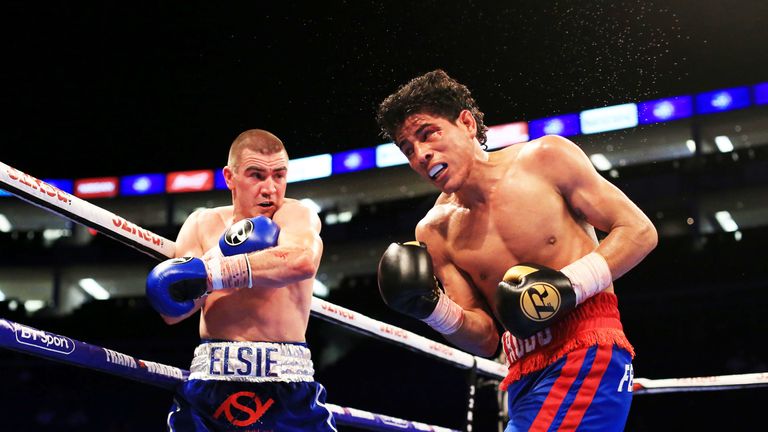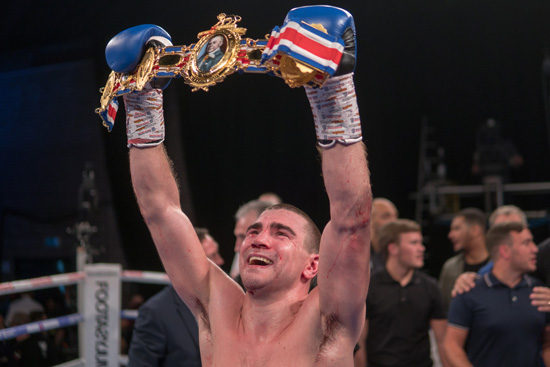Johnny Garton raised a few eyebrows at the beginning of this week when he announced his sudden retirement from boxing. “Due to [unforeseen] circumstances, I am unable to give 100% to this sport and that isn’t good enough for me,” was how the South Londoner explained his decision through a short statement posted on his social media accounts.
Boxing Social contacted the Peckham native a couple of days after the announcement and found Garton in reflective mood. His kind-natured personality still shone through in his voice, but a hint of sadness was also audible.
“I’ve been better, to be honest with you,” he said. “It’s not something I wanted to do, but I just had to at the end of the day. It’s come down to a few things. I’ve had to start a new job and, the job I’ve just started, the hours are a lot longer than I expected. So I’m not able to train properly and, if I did, I’d probably end up burning myself out. I’m just not going to be able to get to the gym and train properly.”
The belief that aprofessional boxeraccumulates wealth is usually misplaced. We may double tap our smartphone screens as Floyd Mayweather sits at a marble table, glancing through the lenses of his Gucci sunglasses at a money pit of dollars, but the distance between the ground and Floyd’s private jet in the clouds make for a perfect measuring stick between an elite and domestic level boxer’s income.

It is not uncommon to see a pro boxer training whilst employed in full-time work, but to climb the boxing ladder towards major titles, the fight game must be the priority. This is where sponsorship becomes even more vital to fund the campaign.
Garton (24-2-1, 10 KOs) is a former British 147lbs champion and had the chance to claim his belt back against his conqueror, but an untimely pandemic replaced that challenge with a different one.
“I was meant to be fighting [Chris] Jenkins and that fell through,” said Garton. “I didn’t get sponsorship [money] until the fight and, obviously, the fight fell through, so I got no sponsorship. I had paid out for a whole camp, so I had to pay out of my own money. I was moving house at the same time and then Covid-19 happened, so I’ve paid for a house and got no income coming in. I’ve had to start work and go from there really. So it wasn’t the plan [to retire].”
Losing fighters from the sport through economic reasons has been a fear since the beginning of the pandemic and the status of former British champion doesn’t result in immunity from the current situation.
Bad luck has certainly played its part for Garton and hindsight has kicked his frustration into overdrive. A lucrative opportunity presented itself when promoter Eddie Hearn and contender Conor Benn came knocking, but the 33-year-old chose another route.
“[Benn] was shouting my name out for a long time and, especially with the British title on the line, it was a fight they were willing to pay quite a bit of money for,” recalled Garton. “It would have been a cracking fight, me and Benn. I’m gutted it never happened.
“I spoke to Conor a few times and said, ‘Listen, you’re just a payday to me’ and they did come back to me with a good price, but then I also got offered Chris Jenkins for the British and Commonwealth titles, plus he beat me so it was more personal. So I chose that fight over Benn thinking, ‘If I beat Chris, then the stakes will go up and I’ll get more money [to fight Benn]’ but it’s not worked out as I planned it.”
Despite circumstances resulting in a premature retirement from boxing, Garton is now earning money, resulting in paying his bills and, most importantly, taking care of his young family. He explained that further job opportunities will open up for him once the lockdown eventually ends when a few companies will be in a position to offer him work, giving him breathing space to strategise on a long-term plan for life after boxing.
“I’ve always been trying to think what it is I want to do, but I honestly don’t know,” said ‘The Pexican’. “I love boxing so much that it’s all I want to do, but I’d like to think I’ll always be involved in the sport. I’ll take my seconds licence, coach people or help out. I’ll always be a part of iBox [Alan Smith’s south London boxing gym] and will make sure I’m around it and train as much as I can. I’ve been in the game a long time now, so I’ve got some knowledge I will share and help out however I can.”

promoter Frank Warren. Photo: Queensberry Promotions.
Garton’s rise to British welterweight champion by taking the traditional route through the small halls, mixed with his front-foot, all-out attack fighting style made him a fan favourite within the boxing fraternity. Claiming the Southern Area and English titles earned him a promotional deal with Queensberry Promotions and, under the guidance of Hall of Fame promoter Frank Warren, Garton went on to claim the IBF European belt and then the British crown in a fight of the year contender against Gary Corcoran (WTKO11).
“When I first turned pro, I honestly did not think I was good enough, but I gave it a go, so I didn’t look back in the future and regret it,” said Garton. “We tried to aim for a Southern Area title, I got that. Then every time I aimed for something, I achieved it. My all-time goal was to win a British title and I won it, so I’ve had a fantastic career.”
Those who are fortunate enough to know Garton will agree that he is one of the friendliest guys within the sport. It may not have been the fairy tale ending he had hoped for, but the knowledge and experience he is willing to share will go a long way for those who ask for it.
Boxing Social wishes Johnny Garton all the best in his future endeavours.